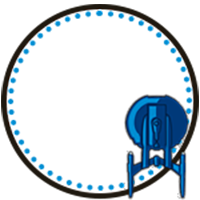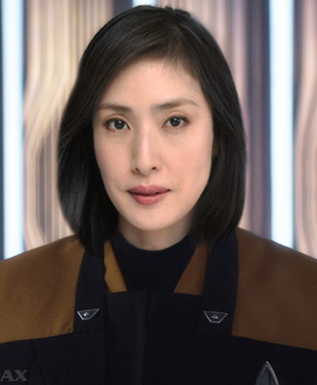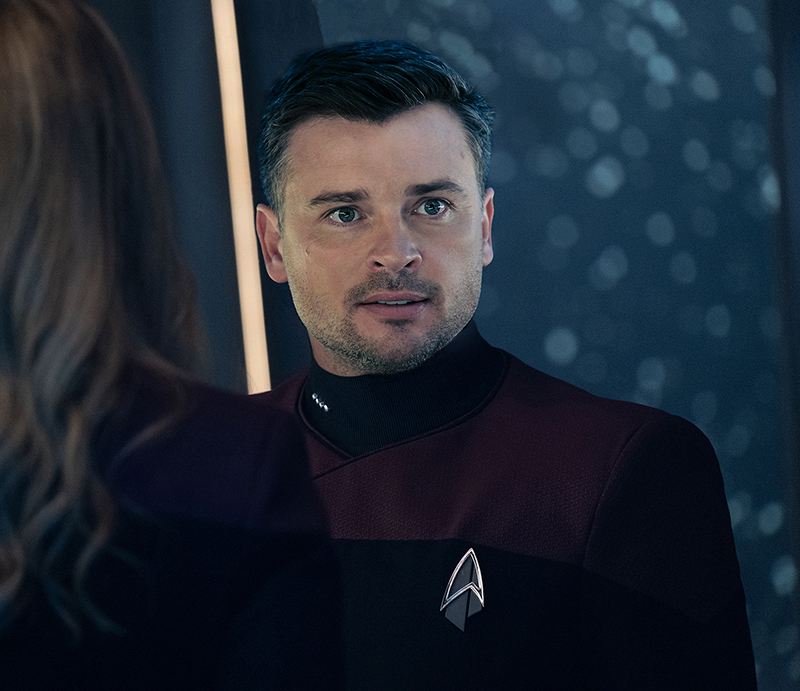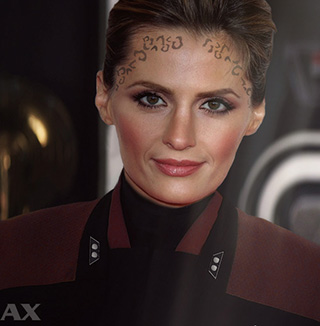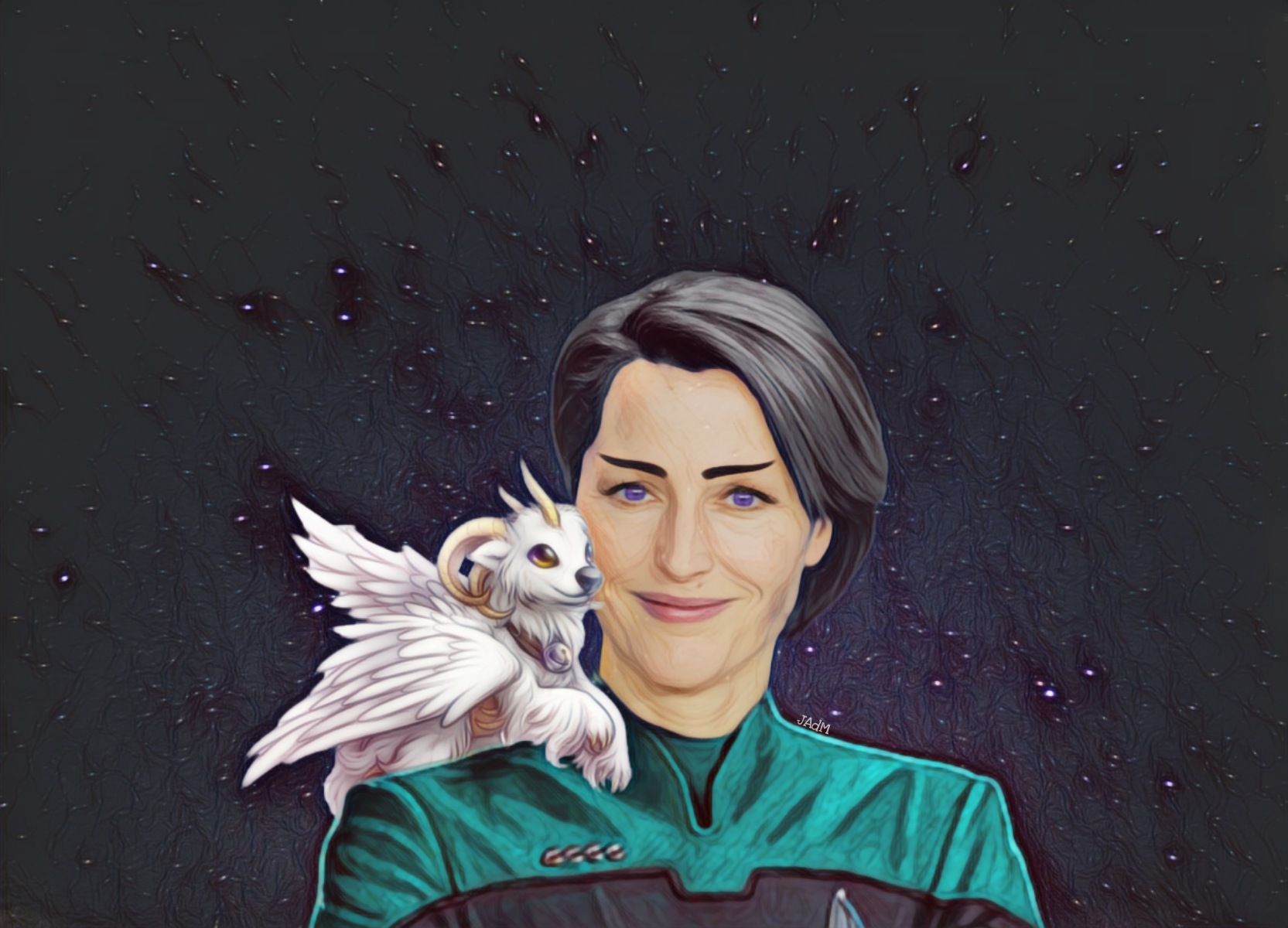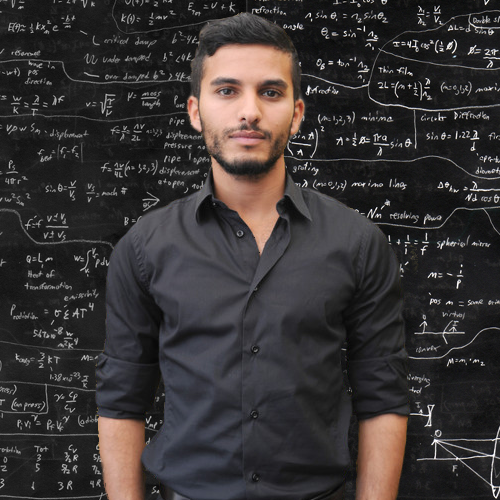Iskander al-Kwaritzmi, Personal Log, supplemental: The USS Franscini has been found unmoving in the middle of an ion storm. It seems to be entirely powered-out with the exception of the deflector dish that is being run in such a way that no communication or scan is possible. I have been selected to join the away team, as assistence might be needed on the Franscini. We are suited-up. No matter how much I prefer transporters to shuttles, with no chance of locking, we are going to travel the old-fashioned way.
The interior of the Mesa was cramped. Every passenger seat of the Type-6A shuttle was occupied, making it eight with the two pilots.
Iskander al-Kwaritzmi sat between Ensign Diran Koli and the Arcadian Lieutenant JG Sirti-nei-Plex — the three engineers of the away team. Opposite them, inside of the Mesa, sat Lieutenant Commander Therese Siouinon, Ensign Koj and Lieutenant Jerome Friedrichsen: a science officer, and two security officers.
This oddly-balanced mix of departments probably told a lot about how the senior staff regarded the mission on the Franscini.
Iskander turned his head to the left and looked out of the viewing window of the shuttle. They were inside of the ion storm, and everything was swirly purple shades and lightning. Every now and then they could see the Sierra, the twin shuttle, that was leading the way a couple of hundreds meters in advance.
The shuttle, maybe hit by a stray lightning bolt, or maybe encountering a plasmatic perturbance, shook. Its structure made slight, strange noises.
“Are we sure that the ion storm can’t damage the shuttle?” asked Lieutenant Sirti with his nasal, high-pitched voice.
“Yes” replied Commander Siouinon. “It is not a very strong storm. It would eat through an EV suit, but it’s not going to damage a shuttle.”
“The Franscini has been exposed to the storm for a long time” remarked Friedrichsen. “And from what we know it doesn’t have shields. Any chance that the storm might have pierced a hole in the hull? Or that it might do that while we’re in there?”
“The Franscini looks undamaged” replied Siouinon. “But without scans we can’t be sure.”
“A storm of this intensity would probably need three months to eat through a duranium hull” said Iskander, who had nervously done the calculation before leaving. “They have been here for days at most — there is no risk of a beach.”
“It’s not a very strong storm” repeated Siouinon.
The shuttle shook.
“How long more?” asked Friedrichsen to the pilots.
“Hard to tell without a clear vision, Sir, but I’d expect we’ll see it within a couple of minutes.”
“What if it is a pathogen?” asked Ensign Koj.
“A pathogen?” said Lieutenant Friedrichsen.
“You know” tried to explain Koj, “one of those pathogens that produce violence and madness. You end up running around a ship with a sword or trying to teleport part of a planetary core because you want light. Or they become zombies or murderous! Maybe they’re inside of the ion storm because the pilot wend insane and decided –“
“Ensign” intervened Commander Siouinon, “we are not to speculate. We’re going to suit up if there’s any sign of biohazards.”
“I apologize, Commander.”
“There!” called the pilot.
Vague, far into the storm, a large lumbering shape was becoming visible, as if half-seen through purple fog. The warp nacelles of the USS Franscini — so similar in design to those of a California-class starship — were clearly recognizable. The Sierra had come to the full stop, maybe a hundred meters from the shuttle bay of the Franscini, and the Mesa joined it.
There was a beeping and the co-pilot opened a communication channel. Even with the shuttles next to each other, the quality of the call was dreadful — almost all noise and static. The deflector dish of the Franscini was really making it impossible.
“We have tried communications” came the voice of Commander Vistia Xe, “but there has been no answer. We are going in.”
“Acknowledged” replied Siouinon. “After you.”
The shuttles started, slowly, moving towards the Franscini: as they did, more and more of the ship appeared, large and dead in the middle of the storm.
“It doesn’t look damaged at all” commented Diran Koli, ever the cheerful optimist. “And not even a bit Borg-ified.”
“We are not to speculate” repeated herself Commander Siouinon.
Iskander thought with some dread of the mention of the Borg. None of the senior staff had even said why they’d suspect Borg presence, but had been clear that the crew should remain attentive.
The Borg had always been a presence in Iskander’s life. He could barely remember his father Adam: enormously tall (although that was probably just a reflection of Iskander being a child), always smiling, passionately devouring large quantities of hummus and carrots, with an exaggerated bushy beard (although the pictures, despite his memory, showed a well-kept short beard). He had been a security officer on an old Starfleet cruiser that patrolled the Tau Ceti system and adjacent — he would be at home almost half of the time. Shortly after Iskander’s eighth birthday, he had been out on a patrol when the ship had been called to Earth to reinforce against a Borg Cube.
Iskander had never seen his father again. Before leaving, the day before the battle, the whole family had been particularly cheery: they had invited the neighbors, played games, and Adam had read a bedtime story to Iskander: J.R. Yimanki’s Mirrors and Mice. Iskander had never finished the story, and — unconfessed to anyone — he still kept the book, with the same bookmark still wedged between the pages where his father had stopped reading almost thirty years ago.
This was, since then, probably the first time he had been this close to the Borg — with the exception of his period at the Academy, complete with “survive the Borg cube” simulations and similarly traumatizing seminars on Borg macroengineering.
“Iskander?” asked a voice.
Diran was looking at him, with a neutral expression. As was, ever attentive and less sympathetic, Commander Siouinon.
Empaths, thought Iskander.
“Hm –” he improvised. “More than the hull structure, I worry about life support, Ensign Koli. If most of the ship is powerless, then temperature and oxygen levels might be completely off.”
Diran’s expression showed that he hadn’t bought this diversion, but the Commander nodded.
“A valid concern” said Commander Siouinon.
The hangar door loomed now outside of the front viewing window, dark, ready to engulf them. The Mesa, blindly and slowly, slid into it as if it were a mouth.

 Bravo Fleet
Bravo Fleet







